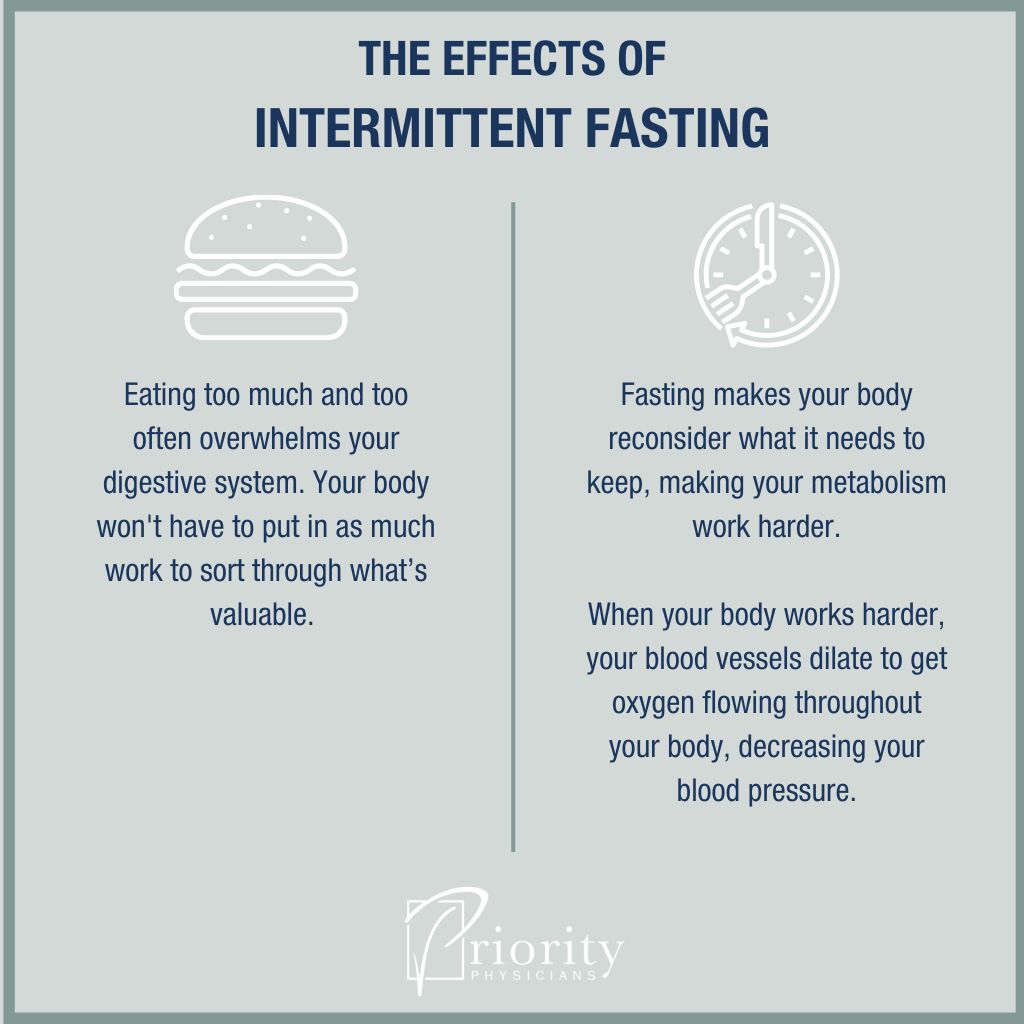Many people have hypertension, or high blood pressure, and don’t even know it.
Often, they don’t know their blood pressure is rising unless they’ve been measuring it, and once they start experiencing symptoms, it’s often too late. Left untreated, high blood pressure can lead to heart disease, heart attacks, and strokes.
High blood pressure has many causes, including certain medications, a lack of exercise, and environmental and genetic factors. Luckily, one of the simplest ways to reduce your risk of high blood pressure is to change your diet — and you don’t have to count calories or study labels to do it.
The dietary change is something that might not seem related to blood pressure at first glance: fasting.
We’ve talked about both fasting and blood pressure on the blog before, but never together. So if you’re interested in exploring the link between fasting and blood pressure, read on.
How Does Fasting Lower Your Blood Pressure?
Many of my patients think limiting their sodium intake is the only key to lowering their blood pressure. While reducing salt intake definitely helps, the issue with our diets is larger than salt alone.
We live in a world of excess, which isn’t good for maintaining balance and efficiency. When, as adults, we graze on snacks and big meals throughout the entire day, our bodies get used to taking in too much food and become lazy. (This doesn’t apply to children, who need more food to grow.)
Think of your body as a machine. The cardiovascular system is a pump with pipes connected throughout the body. High blood pressure means your pump (heart) is working harder than normal to move blood around the body. If the machine was working as it should, your heart wouldn’t have to work so hard to do the bare minimum, and the pressure in your system would decrease.
When you restrict your caloric intake through fasting, your metabolism improves because your body needs to expend energy more efficiently to maintain basic functions — like breathing, keeping your blood sugar up, and keeping your heart beating. In essence, fasting exercises your metabolism. Making your metabolism and body more efficient are key to lowering your blood pressure.

What Is Your Metabolism?
Essentially, your metabolism is how your body processes what you put in it. From a gastrointestinal perspective, that includes swallowing food, breaking it down, absorbing nutrients and getting rid of waste. Think of your metabolism as a muscle. A muscle atrophies and weakens if you don’t exercise it.
If you’re overwhelming your digestive system by eating too much and too often, your body doesn’t have to put in as much work to sort through what’s valuable. It takes the bare minimum of nutrients from your food and discards the rest.
But when you fast, the relative scarcity of your food makes your body reconsider what it needs to keep. This makes your metabolism work harder, which means your digestive muscles need more oxygen to fuel their energy. When your body works harder, your blood vessels dilate, opening up your circulation to get oxygen flowing throughout your body and decreasing your blood pressure.
Those who are hesitant about fasting worry about their blood sugar levels dropping. However, we know that people who fast regularly find their bodies accommodating the fast automatically. These people get a shot of blood sugar in the morning about an hour before they wake up, known as the dawn phenomenon. Caused by a decline in insulin in the early morning hours, it’s a normal process that can help bridge the gap between periods of eating.
Your body loves rhythms and routines, so there may be some growing pains until your body acclimates to eating on a new schedule. But once you’ve adjusted, fasting is one of the best things you can do to lower your blood pressure.
What Kind of Fasting Helps Your Blood Pressure?
So, when it comes to fasting and blood pressure, what kind of fasting am I talking about?
I’m not talking about starvation. When you aren’t bringing in any calories, you aren’t fine-tuning your body — you’re stressing it out and increasing the pressure in your “machine.” In this case, more isn’t better; starvation mode actually causes high blood pressure, along with other health problems.
Intermittent fasting, or time-restricted eating, is what I recommend. When you fast intermittently, you’re limiting your caloric intake to a smaller window of time, but you’re still eating a normal diet each day. For example, you might only eat between the hours of 10 a.m. and 6 p.m. and drink water exclusively outside that window.
We as humans were made to eat in 24-hour periods, but not necessarily three to five times a day. Food itself isn’t the problem — the frequency at which we consume it is. Removing the constant stream of new fuel forces your body to use energy and break down food it had stored as fat.
Extended fasting for days at a time is a different animal entirely. While restricted fasting for 16–18 hours a day can improve your metabolism, you can’t extrapolate that to mean longer times between meals will lead to a stronger metabolism. Fasting for multiple days can send your body into starvation mode and lead to higher blood pressure.
Of course, you should consult with your physician before making any drastic dietary changes, especially if you have a pre-existing medical condition. Luckily, you can influence your blood pressure can through many lifestyle factors — fasting is just one of them!

